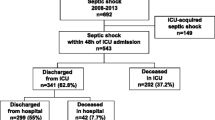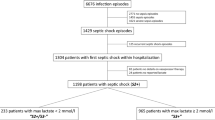Abstract
Septic shock patients who survive past the acute period are associated with an increased risk of long-term mortality. However, factors for predicting late death remain unclear. We aimed to investigate the prognostic factors associated with late mortality in septic shock patients with 28-day survival after admission. This retrospective observational study used a prospective, multi-center registry of septic shock patients between October 2015 and December 2019 involving 12 emergency departments (EDs) from the Korean Shock Society. Adult septic shock patients visiting the ED with 28-day survival after admission were included. Among 4624 septic shock patients, 3588 (77.6%) who survived past day 28 were analyzed. The 90-day mortality rate was 14.2%. Non-survivors were older (66.8 vs. 68.9 years; p = 0.032) and had higher lactate levels (3.7 vs. 4.0 mmol/L; p = 0.028) than survivors. Pulmonary and hepatobiliary infections and a history of malignancy (27.7 vs. 57.5%; p < 0.001) were more frequent in the non-survivor group than in the survivor group. Independent risk factors for late death on multivariate regression analysis were age; malignancy; and hemoglobin, blood urea nitrogen, and albumin levels. The length of intensive care unit stay and Sequential Organ Failure Assessment score were independently associated with late death. Approximately, one-seventh of septic shock patients who survived past day 28 of admission died by day 90. Physicians must pay attention to survivors with these risk factors during the post-acute period as they have an increased mortality risk.

Similar content being viewed by others
Availability of data and materials
The dataset used in the study is available from the corresponding author on reasonable request.
References
Rudd KE, Johnson SC, Agesa KM, Shackelford KA, Tsoi D, Kievlan DR et al (2020) Global, regional, and national sepsis incidence and mortality, 1990–2017: analysis for the Global Burden of Disease Study. Lancet 395(10219):200–211. https://doi.org/10.1016/s0140-6736(19)32989-7
Ryoo SM, Kang GH, Shin TG, Hwang SY, Kim K, Jo YH et al (2018) Clinical outcome comparison of patients with septic shock defined by the new sepsis-3 criteria and by previous criteria. J Thorac Dis 10(2):845–853. https://doi.org/10.21037/jtd.2018.01.96
Rhodes A, Evans LE, Alhazzani W, Levy MM, Antonelli M, Ferrer R et al (2017) Surviving sepsis campaign: international guidelines for management of sepsis and septic shock: 2016. Intensive Care Med 43(3):304–377. https://doi.org/10.1007/s00134-017-4683-6
Winters BD, Eberlein M, Leung J, Needham DM, Pronovost PJ, Sevransky JE (2010) Long-term mortality and quality of life in sepsis: a systematic review. Crit Care Med 38(5):1276–1283. https://doi.org/10.1097/CCM.0b013e3181d8cc1d
Quartin AA, Schein RM, Kett DH, Peduzzi PN (1997) Magnitude and duration of the effect of sepsis on survival. Department of Veterans Affairs Systemic Sepsis Cooperative Studies Group. JAMA. 277(13):1058–63
Shankar-Hari M, Ambler M, Mahalingasivam V, Jones A, Rowan K, Rubenfeld GD (2016) Evidence for a causal link between sepsis and long-term mortality: a systematic review of epidemiologic studies. Crit Care 20:101. https://doi.org/10.1186/s13054-016-1276-7
Kennelly PJ, Martin-Loeches I (2016) Long term mortality following sepsis. Ann Transl Med 4(19):387. https://doi.org/10.21037/atm.2016.08.31
Garland A, Olafson K, Ramsey CD, Yogendran M, Fransoo R (2014) Distinct determinants of long-term and short-term survival in critical illness. Intensive Care Med 40(8):1097–1105. https://doi.org/10.1007/s00134-014-3348-y
Prescott HC, Osterholzer JJ, Langa KM, Angus DC, Iwashyna TJ (2016) Late mortality after sepsis: propensity matched cohort study. BMJ 353:i2375. https://doi.org/10.1136/bmj.i2375
Ou SM, Chu H, Chao PW, Lee YJ, Kuo SC, Chen TJ et al (2016) Long-term mortality and major adverse cardiovascular events in sepsis survivors. A Nationwide population-based Study. Am J Respir Crit Care Med. 194(2):209–17. https://doi.org/10.1164/rccm.201510-2023OC
Ko BS, Choi SH, Kang GH, Shin TG, Kim K, Jo YH et al (2020) Time to antibiotics and the outcome of patients with septic shock: a propensity score analysis. Am J Med 133(4):485–91.e4. https://doi.org/10.1016/j.amjmed.2019.09.012
Kim YJ, Kang J, Kim MJ, Ryoo SM, Kang GH, Shin TG et al (2020) Development and validation of the VitaL CLASS score to predict mortality in stage IV solid cancer patients with septic shock in the emergency department: a multi-center, prospective cohort study. BMC Med 18(1):390. https://doi.org/10.1186/s12916-020-01875-5
Ryoo SM, Han KS, Ahn S, Shin TG, Hwang SY, Chung SP et al (2019) The usefulness of C-reactive protein and procalcitonin to predict prognosis in septic shock patients: a multicenter prospective registry-based observational study. Sci Rep 9(1):6579. https://doi.org/10.1038/s41598-019-42972-7
Ko BS, Kim K, Choi SH, Kang GH, Shin TG, Jo YH et al (2018) Prognosis of patients excluded by the definition of septic shock based on their lactate levels after initial fluid resuscitation: a prospective multi-center observational study. Crit Care 22(1):47. https://doi.org/10.1186/s13054-017-1935-3
Peake SL, Delaney A, Bailey M, Bellomo R, Cameron PA, Cooper DJ et al (2014) Goal-directed resuscitation for patients with early septic shock. N Engl J Med 371(16):1496–1506. https://doi.org/10.1056/NEJMoa1404380
Dellinger RP, Levy MM, Rhodes A, Annane D, Gerlach H, Opal SM et al (2013) Surviving sepsis campaign: international guidelines for management of severe sepsis and septic shock: 2012. Crit Care Med 41(2):580–637. https://doi.org/10.1097/CCM.0b013e31827e83af
Vincent JL, Moreno R, Takala J, Willatts S, De Mendonça A, Bruining H et al (1996) The SOFA (Sepsis-related Organ Failure Assessment) score to describe organ dysfunction/failure. On behalf of the Working Group on Sepsis-Related Problems of the European Society of Intensive Care Medicine. Intensive Care Med. 22(7):707–10. https://doi.org/10.1007/bf01709751
Knaus WA, Draper EA, Wagner DP, Zimmerman JE (1985) APACHE II: a severity of disease classification system. Crit Care Med 13(10):818–829
Thompson K, Taylor C, Jan S, Li Q, Hammond N, Myburgh J et al (2018) Health-related outcomes of critically ill patients with and without sepsis. Intensive Care Med 44(8):1249–1257. https://doi.org/10.1007/s00134-018-5274-x
Clermont G, Angus DC, Linde-Zwirble WT, Griffin MF, Fine MJ, Pinsky MR (2002) Does acute organ dysfunction predict patient-centered outcomes? Chest 121(6):1963–1971. https://doi.org/10.1378/chest.121.6.1963
Abu-Kaf H, Mizrakli Y, Novack V, Dreiher J (2018) Long-term survival of young patients surviving ICU admission with severe sepsis. Crit Care Med 46(8):1269–1275. https://doi.org/10.1097/ccm.0000000000003205
Finfer S, Bellomo R, McEvoy S, Lo SK, Myburgh J, Neal B et al (2006) Effect of baseline serum albumin concentration on outcome of resuscitation with albumin or saline in patients in intensive care units: analysis of data from the saline versus albumin fluid evaluation (SAFE) study. BMJ 333(7577):1044. https://doi.org/10.1136/bmj.38985.398704.7C
Qi D, Peng M (2021) Early hemoglobin status as a predictor of long-term mortality for sepsis patients in intensive care units. Shock 55(2):215–223. https://doi.org/10.1097/shk.0000000000001612
Ferreira FL, Bota DP, Bross A, Mélot C, Vincent JL (2001) Serial evaluation of the SOFA score to predict outcome in critically ill patients. JAMA 286(14):1754–1758. https://doi.org/10.1001/jama.286.14.1754
Borges RC, Carvalho CR, Colombo AS, da Silva Borges MP, Soriano FG (2015) Physical activity, muscle strength, and exercise capacity 3 months after severe sepsis and septic shock. Intensive Care Med 41(8):1433–1444. https://doi.org/10.1007/s00134-015-3914-y
Annane D, Sharshar T (2015) Cognitive decline after sepsis. Lancet Respir Med 3(1):61–69. https://doi.org/10.1016/s2213-2600(14)70246-2
Iwashyna TJ, Ely EW, Smith DM, Langa KM (2010) Long-term cognitive impairment and functional disability among survivors of severe sepsis. JAMA 304(16):1787–1794. https://doi.org/10.1001/jama.2010.1553
Hensley MK, Prescott HC (2018) Bad brains, bad outcomes: acute neurologic dysfunction and late death after sepsis. Crit Care Med 46(6):1001–1002. https://doi.org/10.1097/ccm.0000000000003097
Prescott HC, Costa DK (2018) Improving long-term outcomes after sepsis. Crit Care Clin 34(1):175–188. https://doi.org/10.1016/j.ccc.2017.08.013
Brown SM, Bose S, Banner-Goodspeed V, Beesley SJ, Dinglas VD, Hopkins RO et al (2019) Approaches to addressing post-intensive care syndrome among intensive care unit survivors. A narrative review. Ann Am Thorac Soc 16(8):947–56. https://doi.org/10.1513/AnnalsATS.201812-913FR
Taylor SP, Chou SH, Sierra MF, Shuman TP, McWilliams AD, Taylor BT et al (2020) Association between adherence to recommended care and outcomes for adult survivors of sepsis. Ann Am Thorac Soc 17(1):89–97. https://doi.org/10.1513/AnnalsATS.201907-514OC
Funding
This research did not receive any specific grant from funding agencies in the public, commercial, or not-for-profit sectors.
Author information
Authors and Affiliations
Consortia
Corresponding author
Ethics declarations
Conflict of interest
The authors declare that they have no conflict of interest.
Ethical approval
The institutional review board of each institution approved the study protocol, and informed consent was obtained from the patients before data collection (Asan Medical Center Institutional Review Board No. 2015-1283). All procedures performed in this study were in accordance with the ethical standards of the institutional research committee and with the 1964 Helsinki Declaration and its later amendments or comparable ethical standards.
Additional information
Publisher's Note
Springer Nature remains neutral with regard to jurisdictional claims in published maps and institutional affiliations.
Rights and permissions
About this article
Cite this article
Kim, SM., Ryoo, S.M., Shin, T.G. et al. Prognostic factors for late death in septic shock survivors: a multi-center, prospective, registry-based observational study. Intern Emerg Med 17, 865–871 (2022). https://doi.org/10.1007/s11739-021-02847-0
Received:
Accepted:
Published:
Issue Date:
DOI: https://doi.org/10.1007/s11739-021-02847-0




